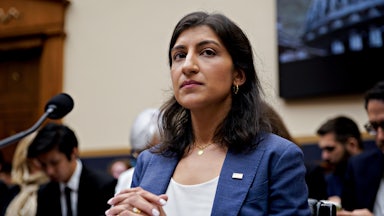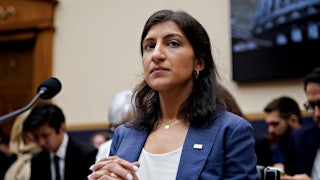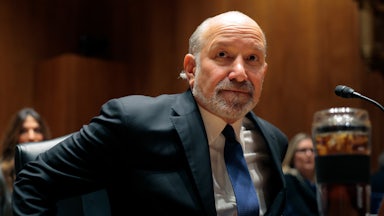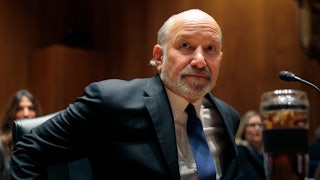On Tuesday, Judge Ada Brown of the Northern District of Texas struck down a Federal Trade Commission regulation barring noncompete clauses from employment contracts. Businesses routinely impose noncompete clauses on their workers in what amounts to a latter-day version of indentured servitude. Granted, employees subjected to noncompete clauses—about 18 percent of the United States workforce—differ from the indentured servants that colonial settlers brought to the New World in that they’re free to quit their jobs. But they’re barred from working for a competitor, which can leave them just as stuck at their existing place of employment.
As Kamala Harris and Tim Walz frame their fall campaign around the theme of freedom—“Mind your own damn business,” Walz said Wednesday night—they should talk up the FTC’s fight against a Republican-appointed judiciary to let Americans work wherever they damned well choose.
The statute that created the Federal Trade Commission in 1914 empowered it “to prevent persons, partnerships, or corporations … from using unfair methods of competition in or affecting commerce” through various means, including through the imposition of “rules and regulations.” As the name rather bluntly indicates, noncompete clauses are a tool used deliberately to suppress competition. Studies show they’re pretty good at doing so: Noncompetes reduce wages, especially for low-wage workers. They also—by discouraging the creation of new businesses—reduce economic dynamism, making them at least as bad for capitalism as they are for workers.
Judge Brown didn’t see it that way; she argued that the FTC lacked statutory power to issue substantive regulations. Weirdly, she conceded that the FTC used its rulemaking powers to issue substantive regulations in the past, and that the D.C. Circuit upheld its right to do so. These included rules governing funeral parlors, the purchase of a franchise business, and telemarketing sales. But because the FTC hadn’t issued any substantive rules since 1978, Brown argued, it could not do so now. Brown also judged the FTC rule “arbitrary and capricious” because the FTC did not consider “the positive benefits of non-compete agreements”—benefits we must take on faith because Brown didn’t enumerate any.
The National Association of Manufacturers, in a May 14 amicus curiae brief opposing the FTC rule, stepped into this breach. It argued that noncompete clauses are “an essential tool … to protect trade secrets and other proprietary information from misappropriation by their competitors.” Trade secret theft, the NAM said, “is a large and mounting problem” (inviting, it seems to me, some skepticism about how effective noncompete clauses are at preventing it).
The FTC has answered the NAM’s trade-secrets objection by pointing out that laws against the theft of trade secrets remain on the books, and that contractual nondisclosure agreements would remain legal under its rule. These protections, it’s said, should be sufficient to deter theft. The NAM replied that these “are poor substitutes for non-compete agreements.” For one thing, businesses don’t always know when their secrets are stolen. That argument amounts to: Better that we constrict the freedom of all our employees than risk that one of them will do us some hypothetical harm.
The NAM further complained that trade secrets don’t enjoy the same level of legal protection as patents. That suggests to me that stealing them may not be as serious a matter as the NAM would have me believe. Finally, the NAM said that “trade secret litigation is costly and slow.” Well, yes, suing another business is costlier and slower than threatening to bury some sad sack of a former employee in an avalanche of legal bills. In a similar vein, I might argue that purchasing a candy bar at the corner store would be costlier and slower than seizing one from the hand of a five-year-old child.
The amicus brief was submitted by Erica T. Klenicki and Michael Tilghman II of the NAM and Richard D. Salgado, Paul W. Hughes, and Andrew A. Lyons-Berg of the law firm McDermott Will & Emery LLP. I mention this because even as these five attorneys argued to the court that noncompete clauses were a vital tool of American commerce, they were none of them at risk of being sued by the NAM should they take employment at some rival organization—say, the Association for Manufacturing Technology, or (God forbid) the AFL-CIO. That’s because the American Bar Association does not permit “non-competition clauses in partnership, member, shareholder, or employer agreements.” What’s sauce for the goose should not be mistaken for sauce for the gander.
Noncompetition clauses are similarly banned in four states. In one of these, California, noncompete clauses have been legally unenforceable since 1872, an obstacle that somehow failed to prevent the state from dominating the agriculture, entertainment, and tech industries. The Golden State’s gross domestic product is $4 trillion, making California the richest state in the union. You may have heard Governor Gavin Newsom mention once or twice that if California were a country, it would be the fifth richest in the world.
Outside the legal world and outside California, how necessary to business are noncompete clauses? Let us turn to Morrison & Foerster, a leading corporate law firm that represents “some of the largest financial institutions, Fortune 100 companies, and leading technology and life sciences companies.” Three of Morrison & Foerster’s attorneys last year published a Bloomberg piece titled, “How To Mitigate Trade Secret Theft, Plus Remedies If It Happened.” The article talked about company-managed VPNs; about nondisclosure agreements; about rigorous exit interviews; about criminal prosecutions under the 1996 Economic Espionage Act; and about various state and federal anti-hacking statutes. One inescapable conclusion: Don’t mess with Morrison & Foerster! But here’s something these three scary attorneys didn’t mention even once: noncompete clauses.
The case on which Judge Brown ruled is one of three challenging the FTC’s rule. Federal judges in Pennsylvania and Florida will weigh in on the two other cases, and eventually the question will get kicked up to the Supreme Court. The prospects for success there are not good, especially after the court sharply reduced the power of regulatory agencies last term in Loper Bright. As 2022’s Dobbs decision established, the Trump-appointed high court doesn’t put much of a premium on individual freedom. But if banning noncompetes ultimately requires that Congress pass a law, that’s all the more reason to vote for Democrats across the board this November. We’ll all be better off when businesses give their employees leave to work wherever the hell they want.










